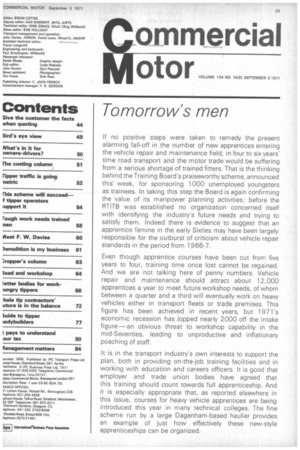Tomorrow's men
Page 25

If you've noticed an error in this article please click here to report it so we can fix it.
If no positive steps were taken to remedy the present alarming fall-off in the number of new apprentices entering the vehicle repair and maintenance field, in four to six years' time road transport and the motor trade would be suffering from a serious shortage of trained fitters. That is the thinking behind the Training Board's praiseworthy scheme, announced this' week, for sponsoring 1000 unemployed youngsters as trainees. In taking this step the Board is again confirming the value of its manpower planning activities: before the RTITB was established no organization concerned itself with identifying the industry's future needs and trying to satisfy them. Indeed there is evidence to suggest That an apprentice famine in the early Sixties may have been largely responsible for the outburst of criticism about vehicle repair standards in the period from 1966-7.
Even though apprentice courses have been cut from five years to four, training time once lost cannot be regained. And we are not talking here of penny numbers. Vehicle repair and maintenance should attract about 12,000 apprentices a year to meet. future workshop needs, of whom between a quarter and a third will eventually work on heavy vehicles either in transport fleets or trade premises. This figure has been achieved in recent years, but 1971's economic recession has lopped nearly 2000 off the intake figure—an obvious threat to workshop capability 0-1 The mid-Seventies, leading to unproductive and inflationary poaching of staff.
It is in the transport industry's own interests to support the plan, both in providing on-the-job training facilities and in working with education and careers officers. It is good that employer and trade union bodies have agreed that this training should count towards full apprenticeship. And it is especially appropriate that, as reported elsewhere in this issue, courses for heavy vehicle apprentices are being introduced this year in many technical colleges. The fine scheme run by a large Dagenham-based haulier provides an example of just how effectively these new-style apprenticeships can be organized.










































































































































